© 2016 The Texas Lawbook.
By Patricia Baldwin
(Aug. 1) – Four former Olympians are looking forward to watching the televised Rio Olympic Games that open Aug. 5. Looking back to their own experiences, these Texas attorneys tell personal backstories that give insights to the quadrennial event considered to be the world’s foremost sports competition.
Their vignettes follow these top-of-mind recollections.
• Conrad Adams of Matthews & Associates in Houston competed in the 1992 Olympic Games in Barcelona as captain of the U.S. Pentathlon team. He re-connected in Spain with athletes who were part of a swim team carpool in his youth in Virginia.
• Brian Farlow, partner at Gruber Elrod Johansen Hail Shank in Dallas, competed as a swimmer at the 1984 Olympics in Los Angeles. He’s quick to mention the Opening Ceremony — where he got a photo of the torch runner — as symbolic of a “lifelong dream.”
• Adam Setliff of the Setliff Law Firm in Dallas threw the discus in the 1996 Olympics in Atlanta and in 2000 in Sydney. His clearest memory is of 100,000 Australians screaming for their national hero Cathy Freeman, who was running and winning the 400-meter dash at the same time as the discus competition. “I’ve never heard audio overload like that,” he says.
• Oba Thompson, an associate at King & Spalding in Houston competed in track and field at three Olympics, winning the bronze medal in the 100-meter dash at the 2000 Sydney Games. He notes, “There is nothing like entering a stadium with over a hundred thousand people, plus hundreds of millions watching around the world, and knowing you have to be at your very best at that moment. The 100-meter dash is akin to a gun fight.”
Conrad Adams
Conrad Adams’ interest in pentathlon competition “just happened.”
He explains that the five events are based on what a military courier once needed to know – swimming, running, fencing, horse-back riding and pistol shooting.

He started swimming about age 8 and running about age 11. He began riding when his parents had a horse farm. And he started pentathlon competitions about age 15.
He went to North Carolina State University to swim, but left after a year to focus on pentathlon training at the national training center in San Antonio.
As previously noted, the Barcelona Games reconnected him to friends from “a very special time in life.”
Participating in the Barcelona Games, he adds, was “very exciting.”
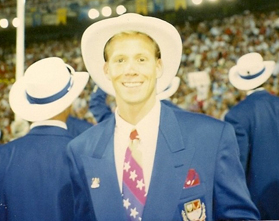
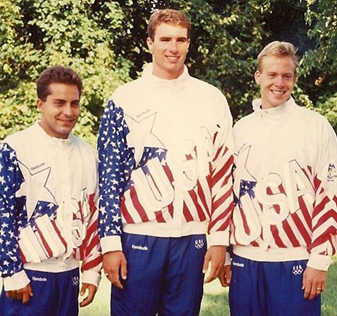
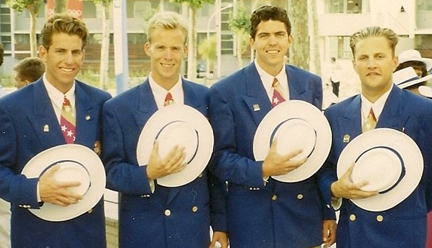
As for the current headlines about allegations of performance enhancement drugs in athletic competitions, Adams comments, “Doping has been around since the beginning of time.”
He supports strict doping controls.
After the Olympics, Adams entered his father’s alma mater of Texas A&M University.
“Through the course of my studies, I found myself on the path to the legal profession,” he recalls.
And while his Olympic experience didn’t play a specific role in directing Adams’ career path, he acknowledges “personalities and characteristics carried me to today.”
Athletics and the law, he says, “require a ton of commitment and a singular focus beyond what the average person appreciates.”
He says he’ll enjoy the upcoming televised Olympic coverage, with swimming and track and field having a “special place in my heart.”
And, as he remembers the Barcelona Games, he says, “I am so grateful to have had the opportunity to pursue a dream.”
Brian Farlow
Brian Farlow recalls that belonging to a swim team was part of growing up on St. Croix in the U.S. Virgin Islands. His hero was nine-time Olympic champion Mark Spitz.
And thanks to geography, swim meets introduced Farlow to various cultures. When he was 10, he traveled to the Dominican Republic to compete. As was the custom, team members stayed with local families.
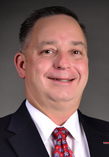
In 1976, he knew swimmers going to the Olympic Games in Montreal. And a dream was born.
That dream took a detour in 1980. Although Farlow qualified for the Moscow Games, President Jimmy Carter imposed an Olympic boycott.
Fast forward to 1984, when the Los Angeles Games coincided with the summer between Farlow’s freshman and sophomore years at the U.S. Military Academy in West Point – a summer with required military training.
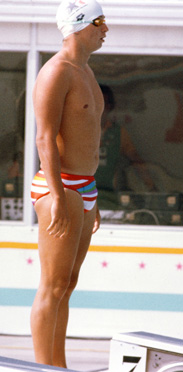
He now preaches, “Don’t give up on a dream because it seems difficult.”
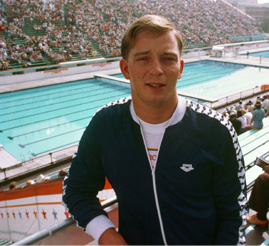
After Farlow completed his U.S. Army service obligation, he decided he had two passions in life: swimming and the law. The latter he attributes to the courses he took in earning his bachelor’s in international relations.
The allegations of doping, Farlow says, are “such a violation of the Olympic Charter. It’s important to keep the Games as clean as you can.”
He notes that technology advances impact some sports, but there’s always a “line you shouldn’t cross.” He remembers athletes from various international competitions who were obviously “built differently.”
Looking back at age 51, Farlow expresses his gratitude at being able to say “I got to compete” versus “I qualified.”
Looking ahead to Rio, he says he will be watching for new Olympic records.
And he loves to hear the Star-Spangled Banner national anthem.
Adam Setliff
Adam Setliff grew up in Big Horn, Wyo., which he describes as “a little town of around 400, give or take.”
On the first day of junior high track practice, he walked toward the school’s track. Ahead of him, he recalls that he saw students “chugging around a dirt track.” To his right, he saw other students “over in a corner of the field throwing things.”
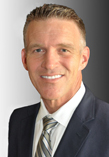
He discovered he had ability, but more important, he became captivated by what he terms “the problem.”
He was constantly challenged to use his body to make the discus fly farther.
“My best memories by far are not of competitions, but of training alone and magical days where the discus flew farther than I had ever seen,” he says. “That turned into nearly 20 years of trying to solve the problem. I loved that.”
That passion for working on “the problem” followed him to the 1996 Atlanta Games and to Sydney in 2000.
“I kind of saw competitions as a necessary evil,” Setliff recalls. “Success in competition allowed me to keep working the problem.”
He adds, “The U.S. doesn’t select Olympians. You win a spot on the team at the Olympic trials. The trials are exactly that – a mental, physical and emotional trial.”
Because of the competition, he admits he was exhausted when he arrived in Atlanta.

He recalls that, in law school, he heard the founder of a law firm say that he liked hiring athletes because, for an athlete, losing is just part of the process.
“I think that’s probably true,” Setliff says. “I’d simply never thought of it that way. I’ve lost a ton in athletics and elsewhere, but that’s just the game. You learn and try again. You’ll win some, too.”
Setliff calls the allegations of doping as “maddening.”
He notes, “It was maddening when I was throwing, and the fact that it’s still around is even more so.
He says he is impressed by Travis Tygart, CEO of the U.S. Anti-Doping Agency.
“I desperately wish he had been around when I was throwing,” Setliff says. “I wish him boundless energy, unquenchable zeal and a merciless hand. If you cheat, you should be out for life. No questions.”
As the Olympics in Rio get underway, Setliff will be watching the less publicized events.
“I find those obscure athletes compelling. They’re not making millions. They’ve been solving the problem every single day for years. And they know we get to see what they’ve crafted and share their joy. It’s amazing.”
Oba Thompson
At age 14, Oba Thompson began an international track career representing his native Barbados at various youth and junior-level competitions.
At 17, he accepted an athletic scholarship to the University of Texas at El Paso, where he won four individual NCAA Division I sprint titles. As a junior at UTEP, he placed fourth in the 200-meter dash behind Michael Johnson’s world record performance at the 1996 Atlanta Games.
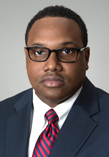
Thompson says that participating at any Olympics is a “wonderfully, stressful experience.”
He entered the 2000 Sydney Games with a toe injury, which added to the stress.
“Real competitors,” he says, “relish being on that edge and putting it all on the line against others who are equally talented, well-trained and hungry. It all boils down to high-level execution.”
He remembers that he finished fourth in the 200-meter dash at the Sydney Games by thousandths of a second because he looked the wrong way at the finish line.
The 2000 Sydney Games were special for Thompson because he wanted to make history by becoming the first individual Olympic medalist from Barbados.
“I was overjoyed at winning an Olympic medal and fulfilling a childhood dream,” he recalls. “My Olympic medal was the product of the many people — family, friends, coaches, trainers, managers and others — who supported me along my personal and athletic life. It was incredible to know that ‘we’ did it.”
Thompson’s interest in the law dates back to his teenage years. He grew up observing his father, now a professor emeritus of history at the University of the West Indies in Barbados, as an adviser to many on various matters.
“He highly encouraged me to think critically from a young age about handling and resolving whatever I faced,” Thompson says. “I also had a cousin who attended the law school in Barbados — under the British system — and he would discuss interesting cases and laws with me.”
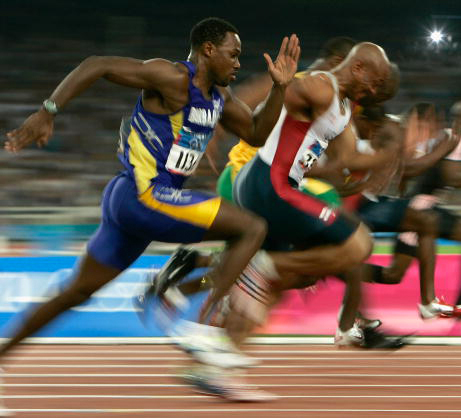
As Thompson transitioned from being an athlete, he created a company focused on media and sports-related activities, including television, motivational speaking, and book promotion appearances.
Now he is part of the international arbitration practice group at King & Spalding and is excited about the firm’s plans to develop sports and entertainment practice areas.
As an attorney, he has researched anti-doping rules and governing bodies. Overall, he says the system must do a better job of embracing its “most important stakeholder—the athletes.” He adds that athletes need greater education and a greater voice in creating the rules that govern them.
When he feels the pressures of work, he says he reminds himself that he has faced much more stressful situations as an Olympic athlete whose fate was decided in 10 or 20 seconds, with no extensions or amendments.
“Knowing I could perform well under those conditions encourages me when I find myself in the inevitable rapids that every lawyer encounters,” he says.
He has a tip for track and field fans: During the Rio Olympics, watch the potential clash between Jamaican track and field superstar Usain Bolt and other sprinters attempting to dethrone him, especially the former Olympic champion, American Justin Gatlin.
Do you have a special avocation, hobby or other lifestyle interest to share? Please email patricia.baldwin@texaslawbook.net.
© 2016 The Texas Lawbook. Content of The Texas Lawbook is controlled and protected by specific licensing agreements with our subscribers and under federal copyright laws. Any distribution of this content without the consent of The Texas Lawbook is prohibited.
If you see any inaccuracy in any article in The Texas Lawbook, please contact us. Our goal is content that is 100% true and accurate. Thank you.
